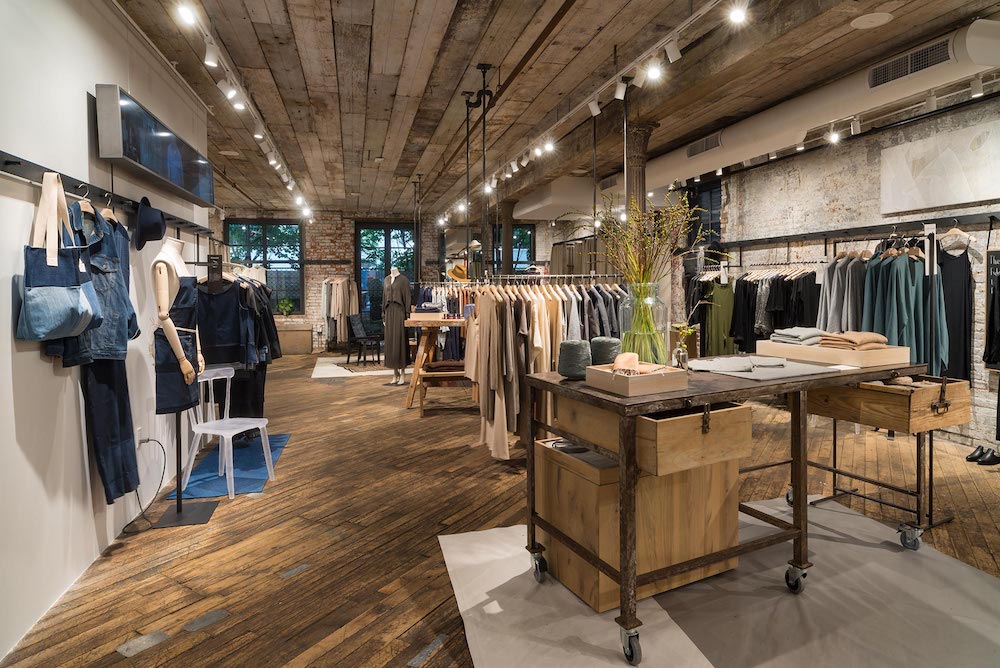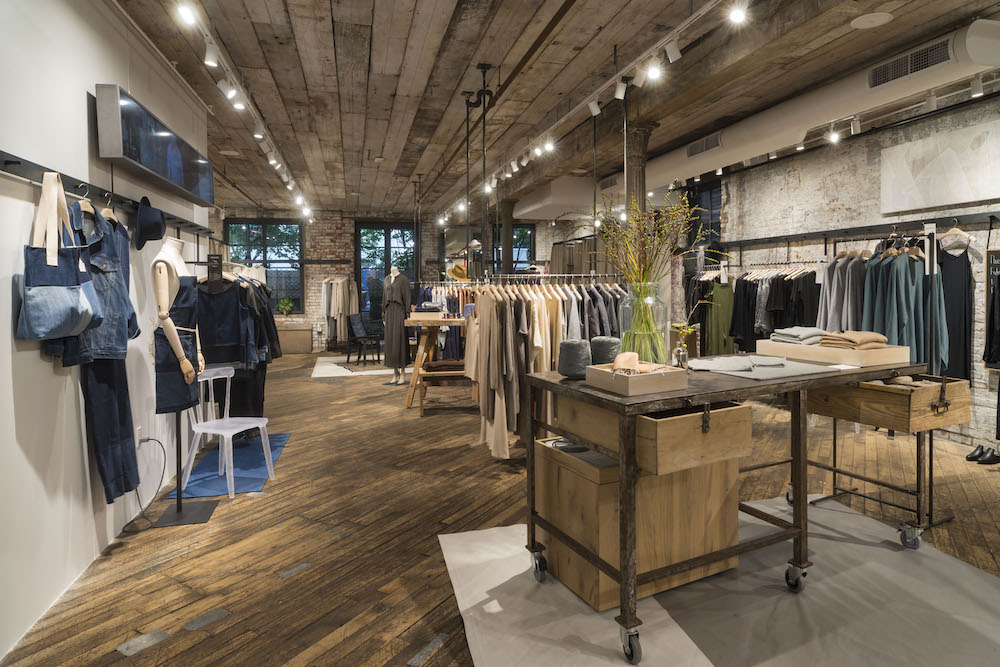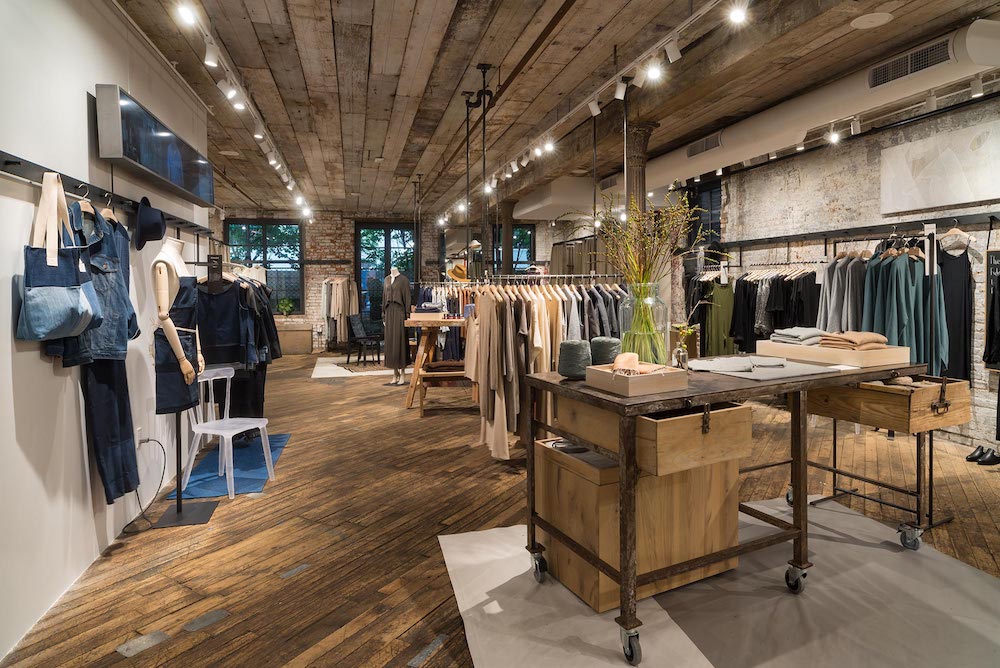Ahead of presenting at PSFK’s Future of Retail 2019 Conference next month, Eileen Fisher’s Vice President, Amy Hall, shares how the brand manages to balance profitability with sustainability, and drive engagement by providing solutions to consumer demand for ethical, transparent retail
As consumers become more aware of the impact of their purchases, they are increasingly less willing to settle, choosing brands that demonstrate conscious production methods that are built on ethical treatment, eco-friendly processes and support social causes. Eileen Fisher is a leading retailer responding to this demand, committed to sustainability, transparency and cultivating consumer loyalty and prioritizing social impact at the core of its brand value.
Ahead of taking the stage at PSFK’s Future of Retail 2019 Conference, Amy Hall, Eileen Fisher Vice President, spoke to PSFK to share insights on why and how the brand is targeting everything from environmental issues like water use and human challenges like fair wages to increasing the longevity of its products, cultivating positive relationships at every point along the production and purchase path to enable circularity, planet health and even encourage consumers to embrace sustainability in their everyday lives.
Could you describe some of the most influential retail industry and/or consumer trends you see taking place, and that you’re leveraging in the work that you do?
Circularity is one: finding ways to reduce or eliminate waste from the take-make-waste apparel system. Clothing rental and resale is another, which is related of course to circularity.
Eileen Fisher started becoming a B corporation, dedicated to generating positive environmental and social impact, in 2012. Could you describe what motivated this transformation, and how it is manifesting today?
We really just wanted to join and support the growing B Corp movement. It felt like a natural place for us, looking at our business impact through the financial, social and environmental lenses.
Upon going through the B Impact Assessment (which is the certification process), we realized we have a lot to learn ourselves. Some of the improvements we’ve put in place include creating a board of directors, creating a social/environmental handbook for our suppliers and establishing a quadruple bottom-line framework for tracking our progress.
What are the particular issues that Eileen Fisher is tackling?

Making Space store, Bergen Ave, Brooklyn by Eileen Fisher
We are tackling so many issues. On the environmental front: materials, chemistry, water and carbon. On the people front: conscious business practices, fair wages and benefits, worker voice, and worker and community happiness. Overall: finding ways to increase the life of our clothing (i.e. our Renew and DesignWork programs).
Do you think consumer awareness and demand has increased or changed when it comes to brands needing to demonstrate positive social impact, transparency, sustainability and ethics? If so, why?
We believe that younger consumers are beginning to demonstrate purchasing behavior that is increasingly aligned with their values. They recognize the urgency of the planetary condition—both from an environmental and human perspective.
They grow up learning about it in school and are anxious to take action in whatever way is possible. Public school and college curricula also incorporate these values throughout. It is truly becoming a way of thinking, and not just an add-on or an elective.
Explain how you think retailers can ideally balance profitability with sustainability and ethical standards. What are some of the tools they can employ to do so? Is technology a factor in this equation?
Technology is a factor, but it is not a solution. For example, we hear a lot about blockchain as a driver in transparency and traceability. In order to utilize blockchain effectively, we need the entire industry to participate and to engage in transparent behavior. We need to know where our products are coming from—all the way from farm to finished product—in order to attach blockchain technology. This requires a mindset change throughout the supply chain in order to be successful.
The best way for retailers to balance profitability with sustainability and ethical standards is to design our supply chains from farm to store, with our values in mind from the outset. This means not trying to retro-fix our suppliers after they’re already on board. Choose well, and the practices will match our values.
There are plenty of auditors, consultants and NGOs who are out there to help. But if we build our supply chains based on meaningful relationships, then we will have more confidence in where our goods come from.

Making Space store, Bergen Ave, Brooklyn by Eileen Fisher
In a nutshell, what are you planning on sharing at our upcoming conference?
I will likely share a bit about the EILEEN FISHER sustainability journey and how our customers have responded to our commitment to ethical and environmentally sustainable design. This will include a peek at our Making Space store in Brooklyn, which shares the full story of how we take back gently used clothing and remake it into new clothing, art pieces and home goods.
What’s in store for the future of EF? How do you plan to continue to evolve and remain a brand at the forefront of sustainability, as well as meet changing consumer demands?
We are fully invested in pursuing circularity (eliminating waste from old clothing to new clothing) and to addressing planetary health in the way that our fibers are grown and managed (which we call “regenerative agriculture.” And we are constantly exploring ways to better share our stories with our customers and to help them embrace sustainability in their own lives.
Come see Amy Hall speak at PSFK’s Future of Retail 2019 Conference on January 16, part of New York Retail Innovation Week, alongside a group of nine other inspiring industry pioneers leading the next generation of retail. Tickets available now!
As consumers become more aware of the impact of their purchases, they are increasingly less willing to settle, choosing brands that demonstrate conscious production methods that are built on ethical treatment, eco-friendly processes and support social causes. Eileen Fisher is a leading retailer responding to this demand, committed to sustainability, transparency and cultivating consumer loyalty and prioritizing social impact at the core of its brand value.

